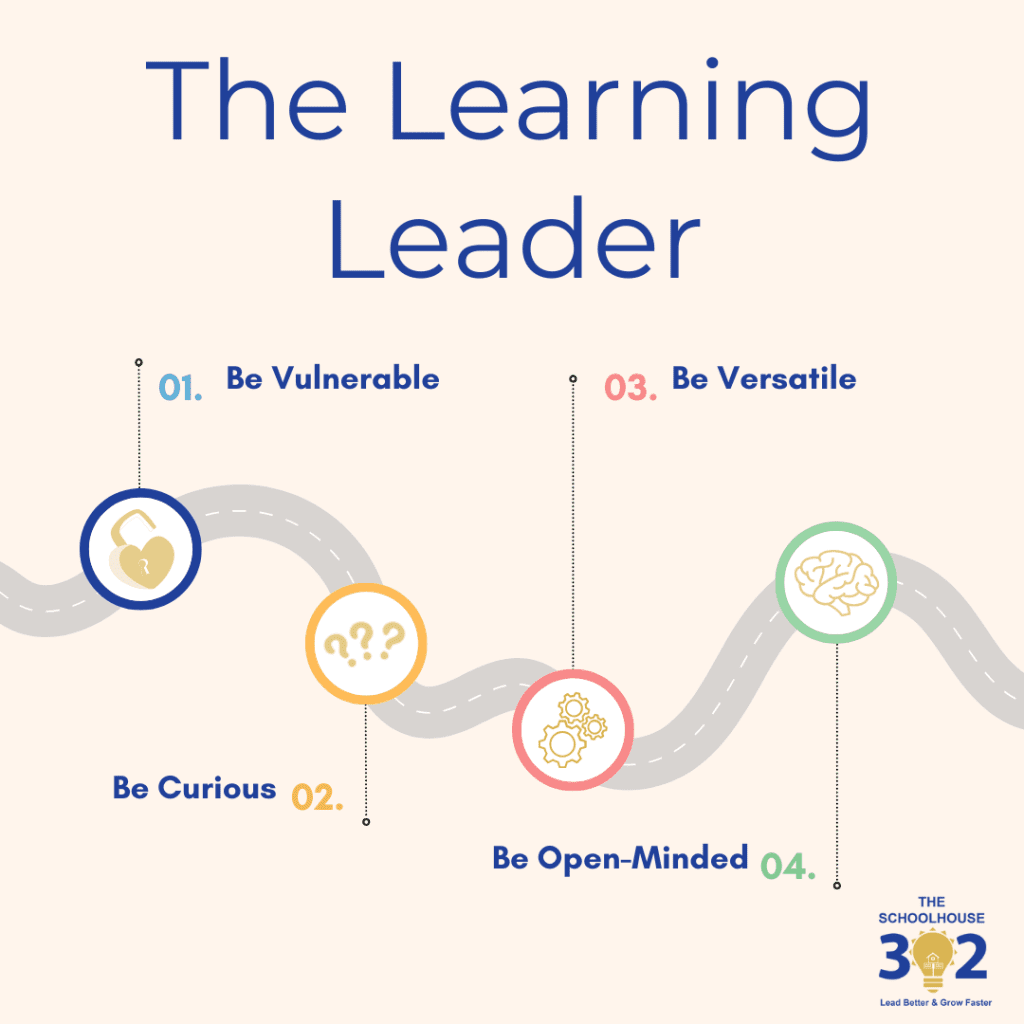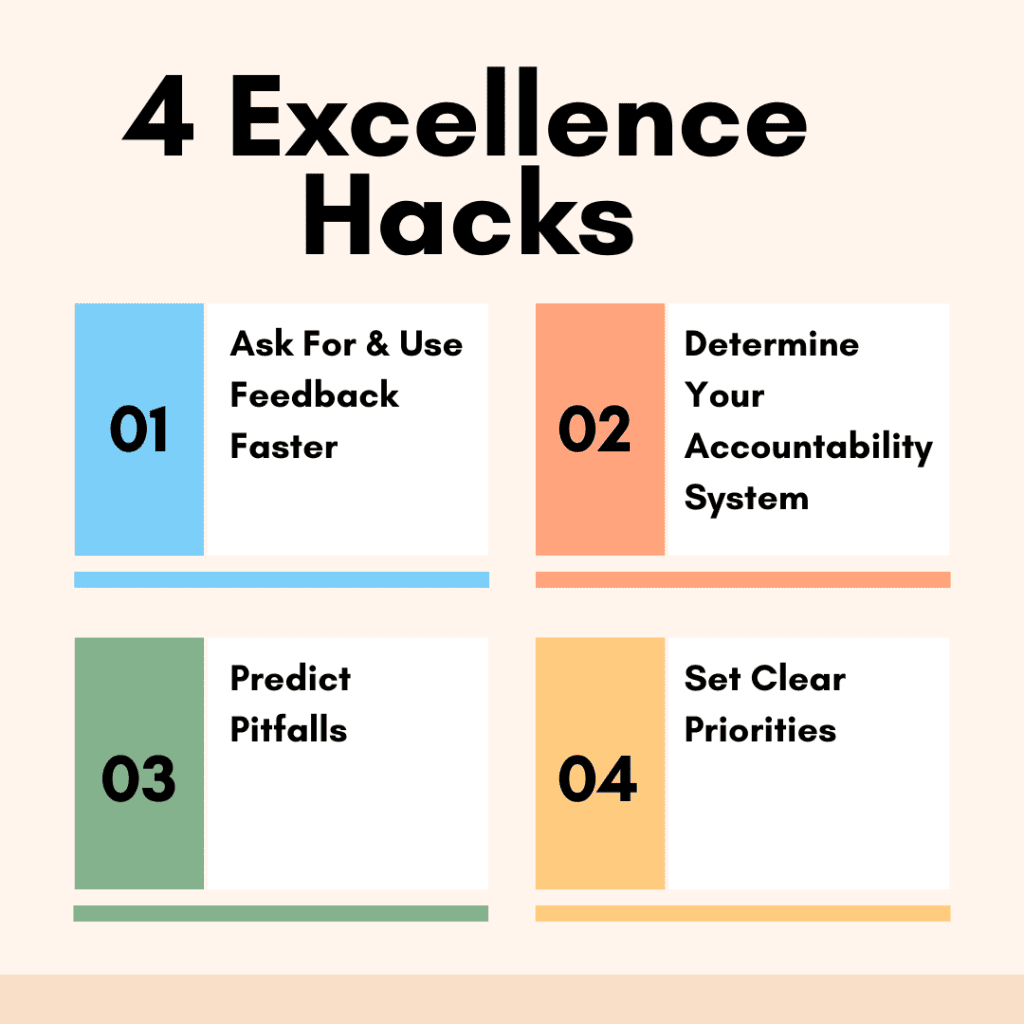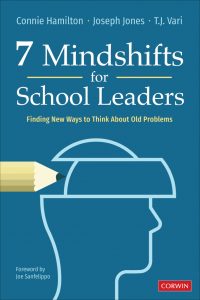
4 Often Overlooked Strategies to Learn as a Leader
Great leaders recognize that their own learning is directly correlated with their actual effectiveness. ~ TheSchoolHouse302
Anyone who is interested in growing as a leader should also be attentive to the speed at which they acquire new knowledge, skills, and abilities through learning. The concept of learning is an art and a science, and if we want to lead better and grow faster, we need to focus our efforts on being a super-learner in the areas that matter most to us.
Unfortunately, leaders are busy people, swamped with duties and responsibilities. Whether you are a principal, teacher-leader, or instructional coach, great leaders serve others. And, while servant leadership has grown to be a widely accepted leadership model, it’s often mismanaged and becomes a one-sided, output driven, approach. In other words, leaders who embrace the servant leadership theory, commonly confuse this method as solely aimed at providing for and serving others, versus also receiving growth experiences for themselves.
The problem is that when leaders fall into this one dimensional style of servant leadership and only address the people they serve, their personal mechanisms for learning stall. The old adage applies: “you can’t pour from an empty cup.” Learning and growing as a learning leader really is like a bank account; you cannot continue to make withdrawals if you do not make deposits.
The good news is that serving others is the foundation to serve oneself. Being grateful and giving to others are both strategies for renewal and servanthood. That said, those aren’t strategies for which leaders learn, grow, and acquire new knowledge. They are great ways to energize our efforts, but they don’t always provide the novel skills and abilities that leaders need as we progress in life and work.
Being a servant leader includes serving yourself, and that means adopting a mindset that embraces learning as much as you can along the way. If you want to excel at being a servant leader, you must also be what we call a “learning leader.”

Vulnerability is not winning or losing; it’s having the courage to show up and be seen when we have no control over the outcome. ~ Brene Brown
#1. Be Vulnerable — Always think like a novice, never overestimate your own expertise
Vulnerable leaders are “more interested in understanding reality than in being right and are not afraid to accept that they are wrong” (Edmondson & Chamorro-Premuzic). This vulnerable approach brings leaders into a learning-centered state rather than one where we need to know the answers. Especially during uncertain times, leaders need to be aware of their limitations. It takes courage to express our invincibility, but it allows us to see ourselves more clearly and take action that results in new learning. There are several key ways that we can engage with the act of being vulnerable. In the realm of learning faster, the critical resolution is to commit to self-improvement and to be open to criticism. The important mental model is that we think like novices and openly share our work for others to provide feedback.
Technical Tip: Be resilient. Resilience allows for growth and maturity. Coupled with one’s ability to remain vulnerable, it is a powerful combination that leads to explosive growth. One key to being resilient is to simply recognize when you’re anxious, which makes it challenging to lead with confidence.
Practical Strategy: Ship your work early. You’ll never know if something is going to be good enough until your audience gets to see a version of it. Whether you’re working on a memo, a blog, or a painting, let your audience comment on how it’s going before it’s done or at least before you think it’s done.
The important thing is not to stop questioning. Curiosity has its own reason for existing. ~ Albert Einstein
#2. Be Curious — Don’t assume that you know something in depth when you may only have a very cursory knowledge of the subject
A great example of a lack of curiosity in practice is education’s application of Professional Learning Communities. We hate to admit it, but the concept of a PLC has been grossly over employed to the point where PLCs have become the nomenclature used as a substitute for what we would consider a commonly scheduled meeting. Just because a group of people are coming together to discuss a topic, doesn’t mean that they’re conducting a PLC. Even if the group is coming together to solve a problem or learn something new, it doesn’t technically fit the description of a true PLC. That said, if we are genuinely curious about how PLCs should work to benefit students, we would study them in depth. We assume too much about our own understanding of the concept, and we move forward, often erroneously. In his book, Curious: The Desire to Know and Why Your Future Depends On It, Leslie calls curiosity a muscle, a natural part of us that atrophies without regular intentional exercise.
Technical Tip: Dive Deep. Learn to study a subject in depth over a period of time. Commit to a list of readings, not just one book or a single article. Develop your own curriculum and create your own learner-directed certificated program in the subject.
Practical Strategy: Block time for yourself as a learner–literally schedule time in your calendar for reading and researching. Because leaders are so busy, if you don’t schedule learning in your daily calendar, it likely won’t happen. We tend to rise to our level of incompetence, not because of a lack of skills but rather a lack of skill development.
With a versatile player, there’s no spot on the court where you can’t pass him the ball. You can do anything. ~ Kevin Durant
#3. Be Versatile — Expand your willingness to use multiple modalities as a learner
As humans, we crave and desire consistency–consistency in how we feel, think, and act, even when it may be to our own detriment. Developing and honing our particular skill set through a preferred medium is fine, but it is through our ability to adapt, maneuver, and respond within different learning contexts that we achieve explosive growth. In Building a Winning Team, we describe the power of cognitive diversity and how it “accelerates learning and performance in the face of new, uncertain, and complex situations.” This is not only true for ourselves but particularly true for our students who benefit from experiencing content in multiple ways.
Technical Tip: Understand yourself. Know your learning preferences and also recognize that the concept of learning styles has been debunked. You can learn from multiple methods, and you should. People tend to approach learning in the way that they feel suits them best. You have far more capacity than that as a learner, and comfort may be getting in your way.
Practical Strategy: On the subject that you’re committing to learn, search for at least one book, one article, one podcast, and one video. Don’t just read, listen, or watch…do all three. Your brain will thank you.
A mind is like a parachute. It doesn’t work if it is not open. ~ Frank Zappa
#4. Be Open-Minded — Often there are multiple perspectives that must be explored and considered
Not only do we tend to fall into our own traps of thinking and doing, there are other powerful reasons for our lack of perspective in life and work. Google and other social platforms force us into the spaces that we’ve already explored. Through cookies and other search optimizations, our digital world is limiting our perspective and creating our environment for us. In fact, Andrew Arnold, in his Forbes article, wrote that “social media is a major influencer when it comes to the purchasing decisions of millennials. In fact, 72% of them report buying fashion and beauty products based on Instagram posts.” To learn more and grow faster, you actually have to challenge what you would typically accept to be true, even if you’re accessing a database of information. As learners, we are obligated to not only expect but to respect all the perspectives on any given subject, not just the one or two that we know best. Even what we hold to be absolute should be consistently revisited and analyzed with a new lens. Reitz and Chaskalson call for this perspective seeking open-mindedness to be done with teams, which provides us with what they call a “meta-awareness.” “Meta-awareness is the capacity to observe and describe experiences from an individual, team, and system-wide perspective rather than being confined solely within any individual’s personal experiences.”
Technical Tip: Enhance your life. Learning to be open-minded enriches your existence. Your ideas, thoughts, values, and goals evolve and expand when you are open to receiving the goodness that the world has to offer. By gaining a greater understanding and an enhanced perspective, you become more versatile in your decision-making ability. Much of this comes from the practice of mindfulness. Don’t miss our podcast interview with the authors of The Mindful School Leader for tips and tricks to use throughout your day.
Practical Strategy: Ask questions of the most diverse players on your team, especially the ones that don’t look like you or have your same background experiences. Here’s a sample question: If there was a way to improve our ability to think creatively together, what would it be? You can find other questions, embedded within an “inquiry” approach to perspective finding in the HBR article cited above.
That’s our model for leading as a learner. If you remain vulnerable, practice being curious, take steps to exercising versatility, and position yourself with an open mind, you will learn more and faster than ever before. That’s what the world requires of its most powerful leaders today. If you stop learning, you also stop leading.
As always, let us know what you think of this with a like, a follow, or a comment.







 7 Mindshifts for School Leaders: Finding New Ways to Think About Old Problems.
7 Mindshifts for School Leaders: Finding New Ways to Think About Old Problems. 


